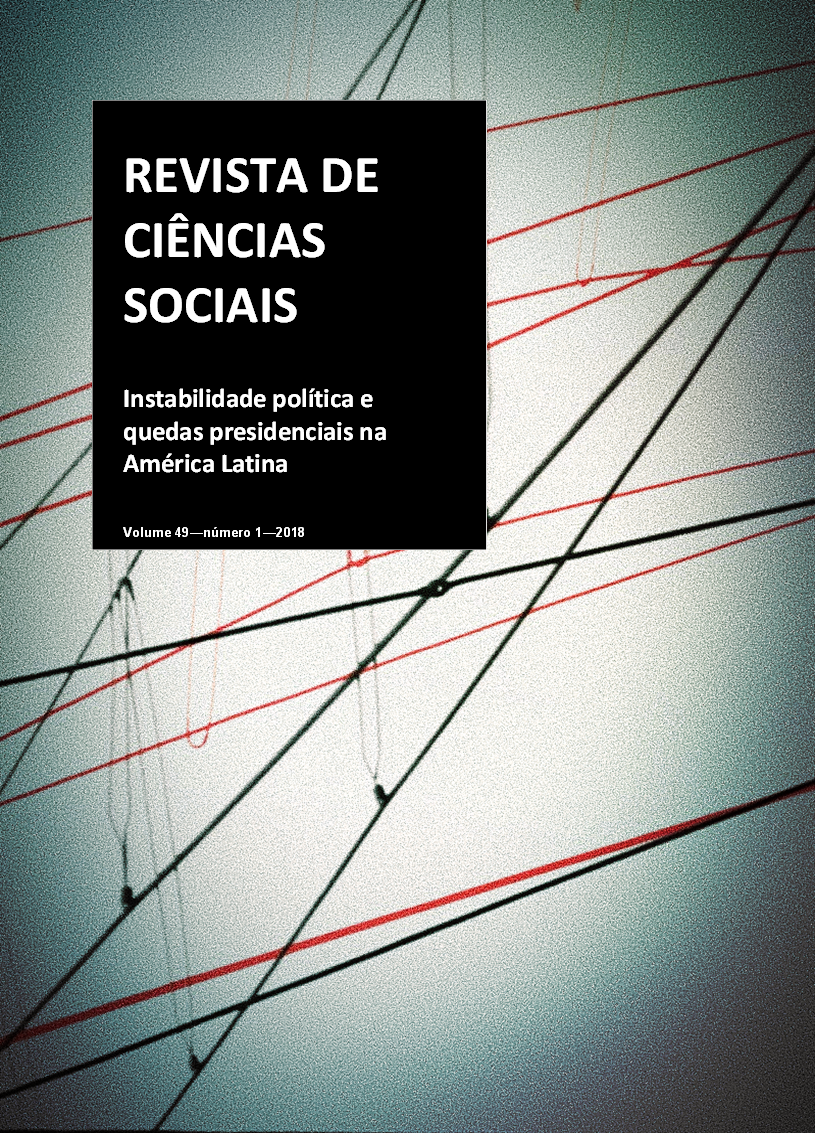Presidential Approval in Latin America (1996-2015): can more participation be a solution when the economy is going bad?
Keywords:
Presidential approval, Mechanisms of direct democracy, Economy’s perception, Latin América, Multilevel modelsAbstract
In a region where Presidents often fail to complete their mandates, it is interesting to ask, beyond the performance of the economy, how much presidential approval can vary with the use of direct democracy mechanisms and with political events. To point out the relevance of these economic, institutional, and properly political issues, such as the dismissal of presidents, in the assessment that citizens make of the Chief Executive is the goal here. The data come from Latinobarometro and encompass opinion surveys conducted annually in 16 countries from 1996 to 2015, analyzed through multilevel models. The coefficients generated indicate that among the micro-level variables, the perception of the current economic situation of the country is the most important, whereas among the macro level, elections, referenda and facultative plebiscites, as well as positive political events are those that influence more the approval of the Chief Executive.
References
ALTMAN, David. Direct democracy worldwide. Cambridge: Cambridge University Press, 2010.
Apablaza, Carolina; Jiménez, Francisco. Factores Explicativos de la Aprobación Presidencial. Serie Informe Sociedad y Política. n.14. Dez. 2009.
Arce, Moisés. Political Violence and Presidential Approval in Peru. The Journal of Politic. Vol. 65. n.2, 2002, p. 572-583.
ARCE, Moisés; CARRIÓN, Julio. Presidential Support in a Context of Crisis and Recovery in Peru, 1985-2008. Journal of Politics in Latin America, v. 2, n. 1, p. 31-51, 2010.
BERLEMANN, Michael; ENKELMANN, Soeren. The Economic Determinants of U.S. Presidential Approval - A Survey. Working Paper Series in Economics 272, University of Luneburg, Institute of Economics, 2012.
BOOTH, John A.; SELIGSON, Michell A. The Legitimacy Puzzle in Latin America: Political Support and Democracy in Eight Nations. New York: Cambridge University Press, 2009.
BOWLER, Shaun; GLAZER, Amihai. “Hybrid Democracy” and Its Consequences. In: BOWLER, Shaun; GLAZER, Amihai (eds.). Direct democracy's impact on American political institutions. New York, Hampshire: Palgrave Macmillan, 2008.
BUENDÍA, Jorge. Economic reform, public opinion, and presidential approval in Mexico,1988-1993. Comparative Political Studies, v. 29, n. 5, p. 566-591, 1996.
C2D. Center for Research on Direct Democracy. Database. Disponível em: <http://www.c2d.ch.>. Acesso em: 29 maio 2017.
Carlin, Ryan; Hunt, Katherine H. Peasants, Bankers, or Piggbankers? The economy and presidential popularity in Uruguay. Política. Revista de Ciencia Política. vol. 53, n.1, 2015. p. 73-93.
Catterberg, Gabriela; Palanza,Valeria. Argentina: Dispersión de la oposición y el auge de Cristina Fernández de Kirchner. Revista de Ciencia Política, vol. 32, n.1, 2012. p. 3-30.
Cohen, Jefrey. Economic Perceptions and Executive Approval in Comparative Perspective. Political Behavior,Vol. 26, n.1, 2004, p. 27-43.
Gramacho, Wladimir. Ciclos de información y funciones de popularidad: El período Cardoso en Brasil (1995-2002). Desarrollo Económico, vol. 45, n.177, 2005, p. 99-121.
INFORME Latinobarometro 1995-2016. Disponível em:
<http://www.latinobarometro.org/latino/LATContenidos.jsp>. Acesso em: 29 maio 2017.
Jofré, Hugo; Navia, Patricio. Densidad de militancia partidarista, aprobación presidencial y el desempeño electoral de la derecha em Chile (2010-2014). Estudios Públicos, 145 (verano 2017), p.37-72
Lebo, Matthew; Cassino, Daniel. “The Aggregated Consequences of Motivated Reasoning and the Dynamics of Partisan Presidential Approval”. Political Psychology, vol. 28, n. 6, 2007, p.719-746.
LISSIDINI, Alicia. La democracia directa en Venezuela: ¿participativa o plebiscitária? Centro de Investigación sobre Democracia Directa (C2D). 2006. Disponível em: . Acesso em: 02 out. 2009.
MATSUSAKA. John. Direct Democracy and the Executive Branch. In: BOWLER, Shaun; GLAZER, Amihai. Direct democracy's impact on American political institutions. New York, Hampshire: Palgrave Macmillan, 2008.
MCALLISTER, Ian. The Economic performance of governments. In: PIPPA, Norris (ed.), Critical Citizens: Global Support for Democratic Government, p. 188-203. New York: Oxford University Press, 1999.
MOREL, Laurence. The rise of government-iniciated referendums in consolidated democracies. In: MENDELSOHN, Matthew; PARKIN, Andrew. Referendum democracy. Citizens, elites and deliberation in referendum campaigns. Grã Bretanha: Palagrave, 2001.
PÉCAUT, Daniel. Tradición liberal, autoridad y autoritarismo. Política. n.42. Universidade de Chile, Santiago, 2004. Disponível em: <http://redalyc.uaemex.mx/redalyc/src/inicio/ArtPdfRed.jsp?iCve=64504205>. Acesso em: 31 out. 2009.
Pérez Liñan, Aníbal. Presidential Impeachment and the New Political Instability in Latin America. Cambridge: Cambridge University Press, 2007.
PINTO, André Jácomo de Paula. Os enigmas da popularidade presidencial no Brasil: economia ou política? Dissertação (Mestrado em Ciência Política). Instituto de Ciência Política da Universidade de Brasília. UNB, 2013.
POWER, Timothy J.; JAMISON, Giselle. Political Mistrust in Latin America. In: Political Mistrust and the Discrediting of Politicians International Studies in Sociology and Social Anthropology. v.96, Leiden; Boston: Brill, 2005.
QVORTRUP, Matt. A comparative study of referendums: government by the people. 2 ed. Manchester University Press/ University of British Columbia Press, 2005.
Ramírez, Jorge; Varas, Pablo. Aprobación presidencial en Chile 2000-2012: Sus determinantes y su efecto en la toma de decisiones. Política, vol. 51, núm. 1, enero-junio, 2013, pp. 85-117.
VREESE, Claes Holger; SEMETKO, Holli A. Political Campaigning in Referendums: framing the referendum issue. London: Routledge, 2004.
ZOVATTO, Daniel. Instituciones de democracia directa en América Latina. In: J. PAYNE, Mark; ZOVATTO, Daniel G.; DÍAZ, Mercedes Mateo. La política importa: Democracia y desarrollo en América Latina. Washington, D.C.: Inter-American Development Bank; International Institute for Democracy and Electoral Assistance, 2006.
Downloads
Published
How to Cite
Issue
Section
License
Autores que publicam nesta revista concordam com os seguintes termos:- Autores mantém os direitos autorais e concedem à revista o direito de primeira publicação, com o trabalho simultaneamente licenciado sob a Creative Commons Attribution License, que permite o compartilhamento do trabalho com reconhecimento da autoria do trabalho e publicação inicial nesta revista.
- Autores têm autorização para assumir contratos adicionais separadamente, para distribuição não-exclusiva da versão do trabalho publicada nesta revista (ex.: publicar em repositório institucional ou como capítulo de livro), com reconhecimento de autoria e publicação inicial nesta revista.
- Autores têm permissão e são estimulados a publicar e distribuir seu trabalho online (ex.: em repositórios institucionais ou na sua página pessoal) a qualquer ponto antes ou durante o processo editorial, já que isso pode gerar alterações produtivas, bem como aumentar o impacto e a citação do trabalho publicado (Veja O Efeito do Acesso Livre).



